Barnett formula
The Barnett formula is used by the UK Treasury to calculate the annual block grants for the Scottish, Welsh and Northern Irish governments.

What is the Barnett formula?
The Barnett formula is used by the UK Treasury to calculate the annual block grants for the Scottish government, Welsh government and Northern Ireland executive. It therefore determines the overall funding available for public services such as healthcare and education in the devolved nations.
In 2021/22, the Barnett block grant amounted to £42bn in Scotland, £22bn in Wales and £16bn in Northern Ireland (before adjustments to account for tax devolution). 12 HM Treasury ‘Block Grant Transparency December 2021 Explanatory Note’, GOV.UK, (15 December 2023), retrieved 21 December 2023, www.gov.uk/government/publications/block-grant-transparency-december-2021 This reflects differences in population size as well as the range of devolved public services in each nation.
How did the Barnett formula come into use?
The formula was first introduced ahead of the 1979 general election by the then Labour chief secretary to the Treasury Joel Barnett, whom the formula is named after. It was initially intended as a temporary solution for determining funding allocations between the UK’s nations, but has remained in use. Until 1999 it was used to determine the level of UK government spending on public services in Scotland, Wales, and Northern Ireland, and since then it has been used to set the budgets of the devolved administrations.
How does the Barnett formula work?
The Barnett formula calculates devolved budgets by using the previous year’s budget as a starting point, and then adjusting it based on increases or decreases in comparable spending per person in England. For example, if spending on healthcare in England increases by £100m, the Scottish Government’s budget would increase by £9.7m since Scotland’s population is 9.7% of England’s. Agreements between the UK governments and devolved administrations to account for historical underfunding and pre-existing VAT exemptions respectively mean the Welsh block grant would increase spending by 115% of per-capita spending in England and the Northern Irish block grant would increase spending by 97.5%. Accordingly, the Welsh government’s budget would increase by £6.4m and the Northern Ireland executive’s budget would increase by £3.3m. Since the devolved block grants are not ringfenced, the devolved administrations would be free to spend the additional money on services other than healthcare.
The Barnett formula only applies to public services that are devolved, and therefore applies to slightly different areas of spending in each nation. For example, if the UK Government increases the police budget, this would result in additional funding for the devolved administrations in Scotland and Northern Ireland, where policing is devolved, but not in Wales, where policing is not devolved. Wales would however benefit from Westminster’s increased police spending on behalf of England and Wales.
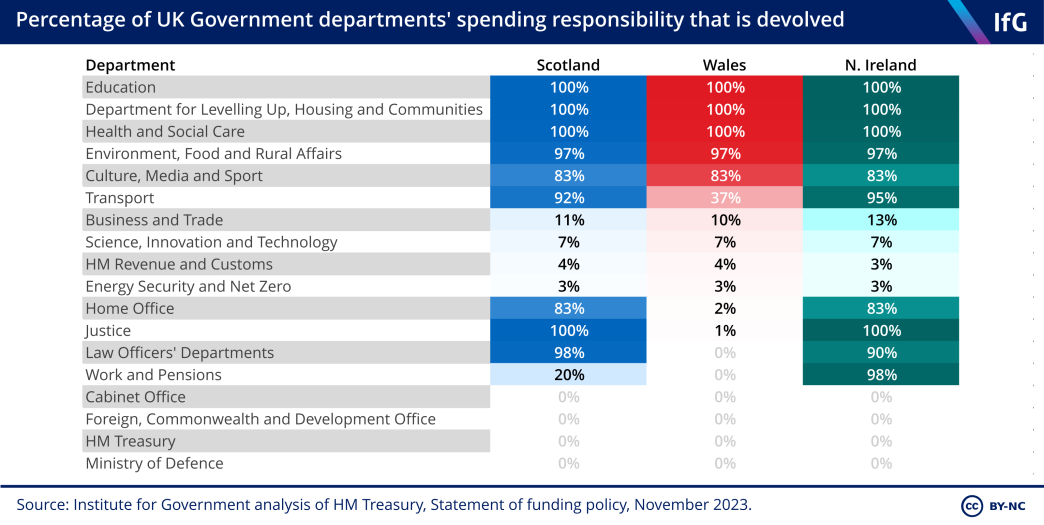
An advantage of this mechanistic formula is that it helps depoliticise the process of setting devolved budgets, removing the need for annual negotiations between Westminster and the devolved administrations. It also ensures relative stability and predictability for devolved budgets, as each year’s budget uses the previous year’s budget as a starting point. In addition, the lack of ringfencing within the block grants means that devolved administrations have the autonomy to choose their own spending priorities (although separate grants are given for resource and capital spending).
Aspects of how the formula operates, however, remain open to interpretation. For example, the UK and devolved governments have disagreed in the past on whether spending on regeneration projects linked to the 2012 Olympics should be classified as England-only spending – which would result in additional funding for the devolved nations – or UK-wide spending – resulting in no additional devolved funding. Currently, the UK Treasury exercises full discretion over this process, with no obligation to transparently publish its calculations. The Treasury can also choose to bypass the Barnett formula entirely, as it did for the £1bn funding package for Northern Ireland that was negotiated as part of the Conservative-DUP supply and confidence agreement after the 2017 general election. The Scottish and Welsh governments objected to the fact that they would not also receive more funding as a result, however there was no formal mechanism to challenge this decision.
What impact does the Barnett formula have on spending in each nation?
On face value, the logic of the Barnett formula – that spending increases in England are replicated on a per person basis in the devolved nations – seems straightforward and uncontentious. In practice, however, the formula has several effects that have proven controversial due to their impact on spending per nation.
In England, the main grievance is that the formula results in significantly higher spending per person in the devolved nations. This is because the formula uses the previous year’s devolved budget as a starting point, and therefore preserves historic differences in spending between the nations. The formula is also slow at responding to changes in relative population size, which further disadvantage England where the population has grown most quickly.
In 2021/22 overall identifiable spending per person was 18% higher in Northern Ireland, 17% higher in Scotland, and 13% higher in Wales. 14 Philip Brien, ‘Public spending by country and region’, House of Commons Library Briefing, (21 December 2022), retrieved 21 December 2023, www.researchbriefings.files.parliament.uk/documents/SN04033/SN04033.pdf
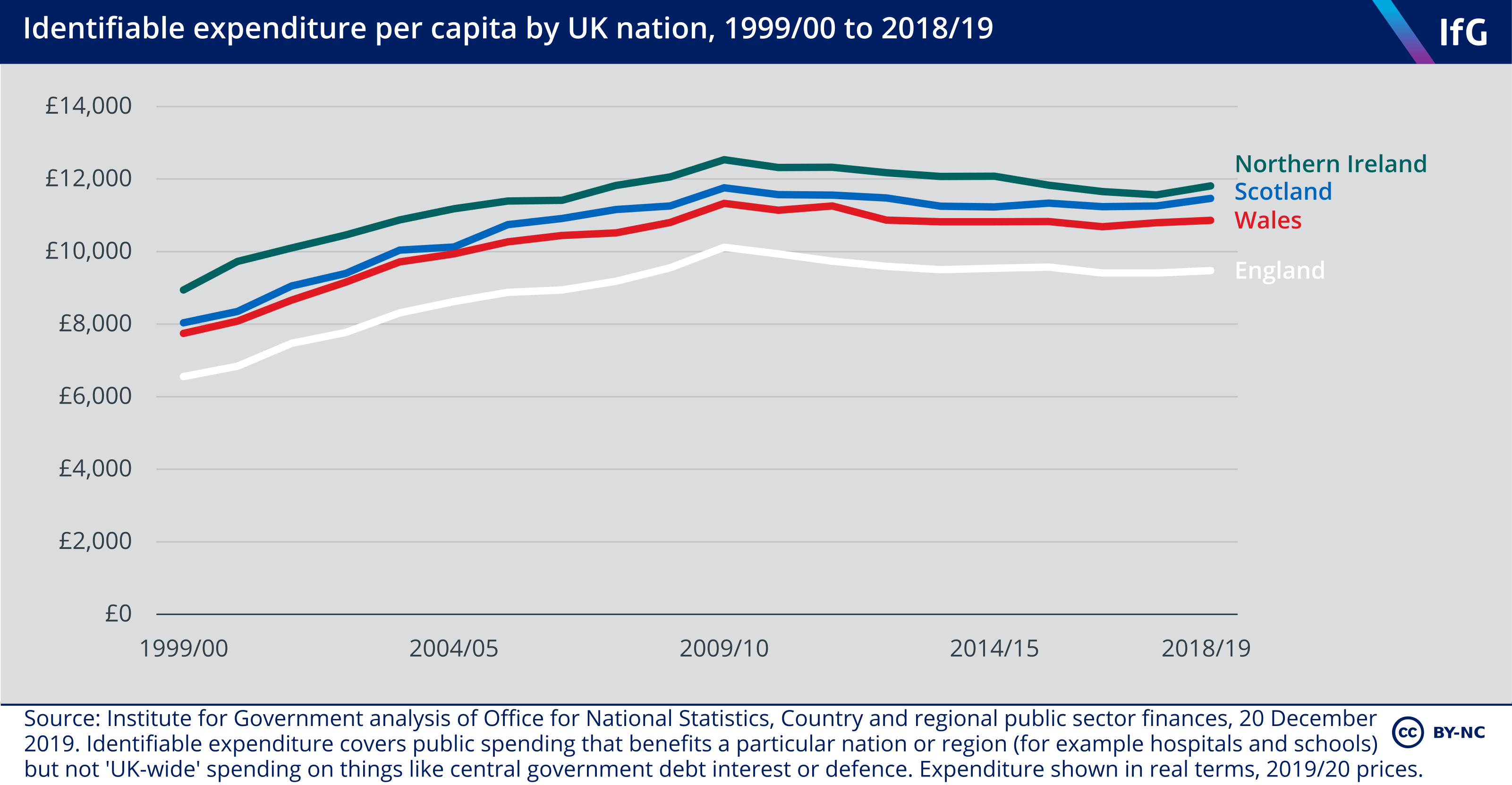
However, in normal periods when public spending is growing in cash terms, the formula causes spending to grow slightly slower in percentage terms in the devolved nations than in England. This creates an effect called ‘Barnett convergence’, where over time spending per person in the devolved nations should converge towards the level of spending in England.
Since 1999 however, the convergence effect has not been observed as quickly as might have been expected. This is because the effect is partly cancelled out by slower population growth in the devolved nations, and also because the convergence effect is reversed during periods of austerity, with spending reductions in the devolved nations slightly smaller than comparable spending reductions in England.
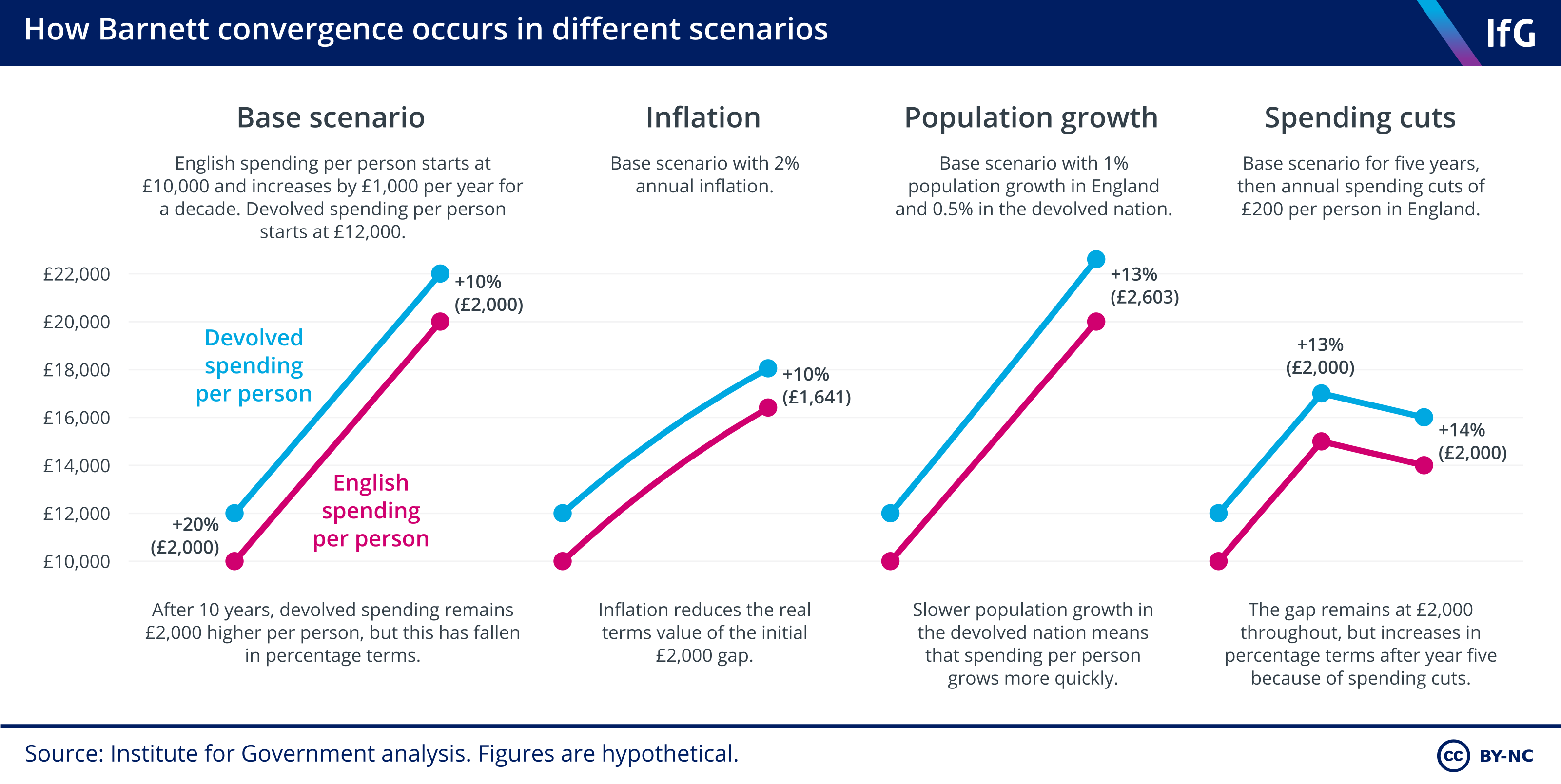
The Barnett formula also does not account for a relative socio-economic needs in each nation. This been a particular concern in Wales, which receives lower per person spending than Scotland through the Barnett formula than Scotland, despite having greater socio-economic needs.
How has the use of the Barnett formula changed in recent years?
Tax devolution since 2015 mean that revenues from certain taxes, such as stamp duty and income tax, now accrue directly to the devolved budgets in Scotland and Wales rather than to the UK Treasury. To account for this transfer of revenue, the UK and devolved governments have agreed that the Barnett block grants should be reduced using a mechanism called block grant adjustments.
These adjustments operate by deducting an amount from the block grant that corresponds to what the UK government could have expected to raise had the taxes not been devolved. The smaller devolved block grants are then topped up by revenues from devolved taxes. This approach retains the Barnett formula as the foundation for calculating devolved budgets, while allowing devolved administrations to influence the size of their overall budget by either varying tax rates or by pursuing policies that generate economic growth.
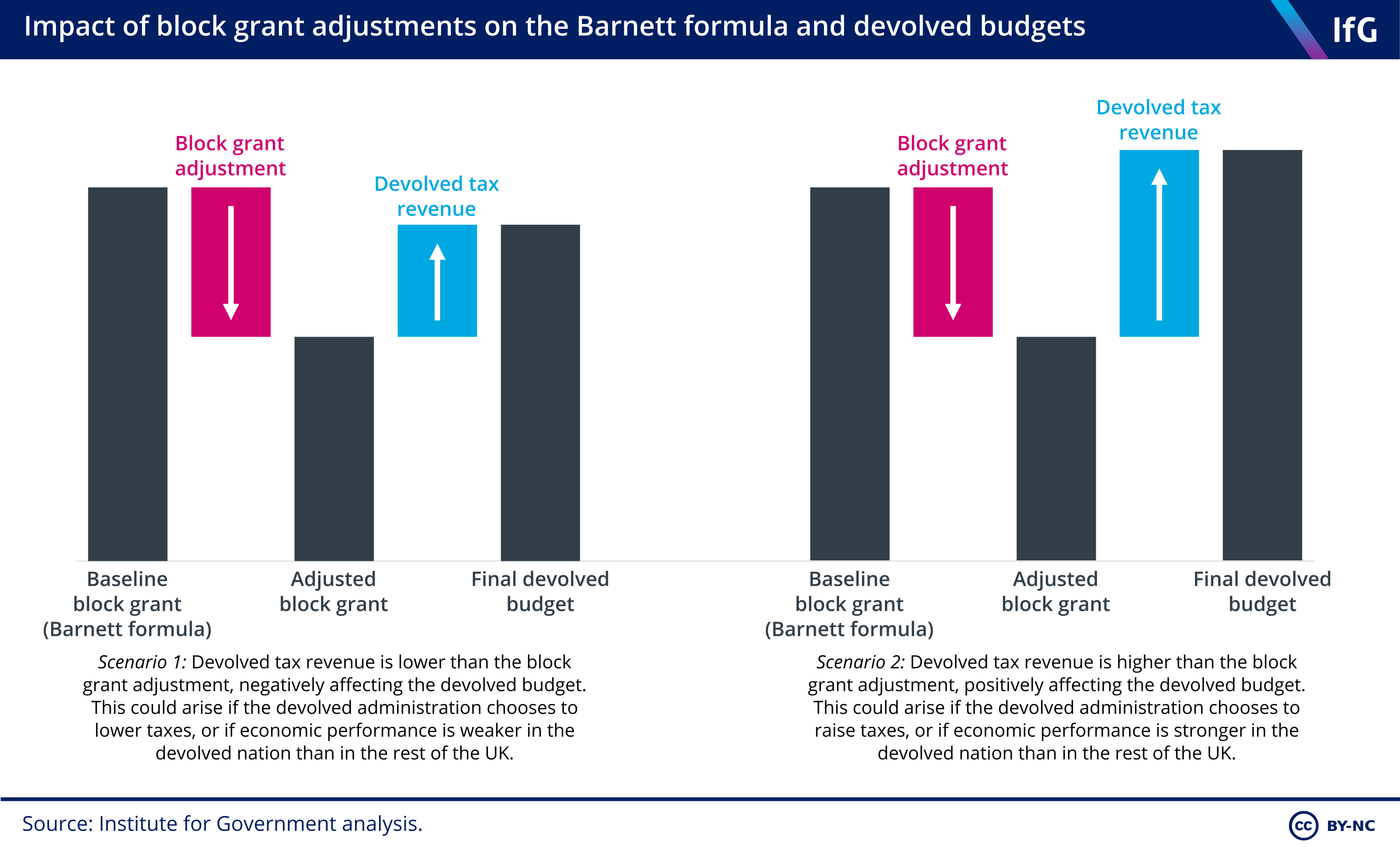
The UK, Scottish and Welsh governments proposed several different approaches for calculating block grant adjustment during tax devolution negotiations in 2016. Eventually, slightly different methods were adopted in Scotland and Wales. In Scotland, the block grant adjustments will reflect changes in relative population size, while in Wales block grant adjustments for income tax have been adjusted to account for the fact that Wales has a higher proportion of low earners and would therefore be disproportionately affected by a UK Government decision to increase the tax-free personal allowance.
The 2016 agreement between the Welsh and UK governments also addressed Welsh concerns about long term underfunding through the Barnett formula. When spending in England increases by £100 per person, spending in Wales now increases by £105 per person, and in the long term spending per person on devolved public services in Wales will converge towards 115% of comparable spending in England.
How has the Barnett formula operated during the coronavirus crisis?
The UK Government increased its spending substantially in response to the coronavirus crisis. Some of this additional spending – including on the NHS, public transport and business support schemes – covered England only, resulting in £9bn of additional Barnett funding for the devolved administrations by July 2020.
However, because spending decisions were being taken at short notice in Westminster, and often subject to later revision, the devolved administrations faced uncertainty about their funding. This resulted in the Treasury adopting a new approach for allocating devolved funding in 2020/21. Instead of allocating additional money to the devolved administrations only after new spending was announced for England, the devolved administrations were each given a guaranteed minimum of additional spending to help them respond to the crisis. In July, this stood at £6.5bn in Scotland, £4bn in Wales and £2.2bn in Northern Ireland, but the minimums were increased in October and then again in November, with the total guaranteed amount now standing at £16bn.
Additional spending on UK-wide schemes, such as the Coronavirus Job Retention Scheme (the furlough scheme) did not result in additional devolved funding as the devolved nations benefited from UK government spending on these schemes.
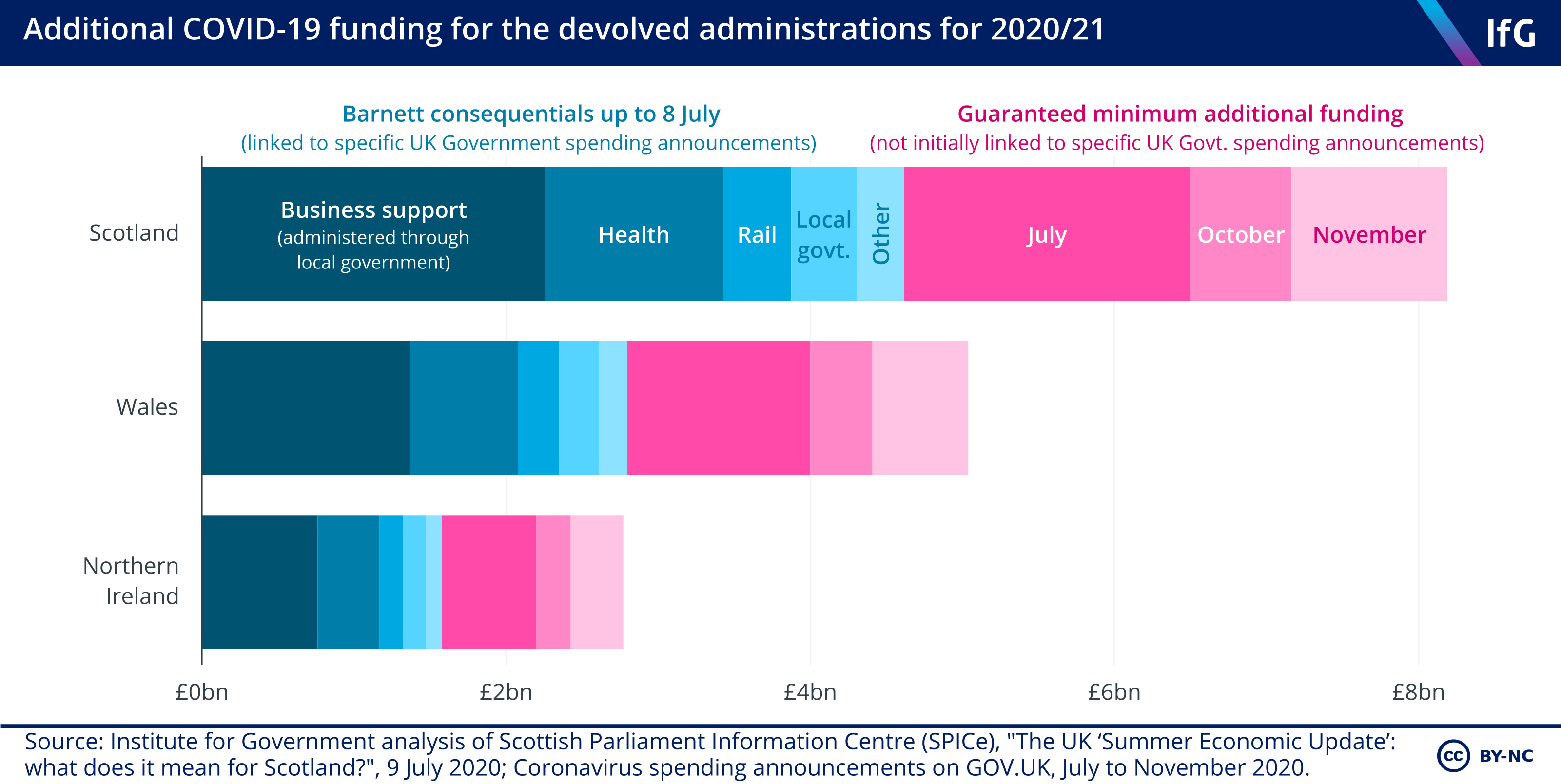
How could funding for the devolved nations be reformed?
Various proposals have been made to reform or replace the Barnett formula. In 2010, after concluding that Wales risked long term underfunding through the Barnett formula, the independent Holtham Commission on funding arrangements in Wales proposed a new needs-based approach to replace the Barnett formula which would have considered factors such as each nation’s level of income poverty, or the share of children and pensioners in the population. 18 Independent Commission on Funding & Finance for Wales, ‘Fairness and accountability a new funding settlement for Wales’, Independent Commission on Funding & Finance for Wales, (July 2010) retrieved 21 December 2023, www.gov.wales/sites/default/files/publications/2018-10/fairness-and-accountability.pdf
A House of Lords report in 2009 also agreed there was a compelling case for a needs-based system for funding the four nations, and criticized the “failure of the Formula to take account of population changes over time” as “arbitrary and unfair”. 19 House of Lords Select Committee on the Barnett Formula, The Barnett Formula (HL 139) The Stationary Office, 2009 The report also recommended that, should the formula remain in use, decisions on how it is applied should be made in open consultation with the devolved administrations rather than unilaterally by the UK Treasury, and that the Treasury should publish its Barnett calculations in a “single, coherent, and consistent publication”. 20 House of Lords Select Committee on the Barnett Formula, The Barnett Formula (HL 139) The Stationary Office, 2009
However, there are also political obstacles to reforming the Barnett formula, particularly in Scotland which benefits from higher spending at present than, almost certainly, it would do under a needs-based system. During the 2014 Scottish independence referendum campaign, the three main Westminster parties reiterated their support for retaining the Barnett formula, amid fears of growing support for Scottish independence.
- Topic
- Devolution Coronavirus
- Keywords
- The union
- United Kingdom
- Scotland Wales Northern Ireland
- Devolved administration
- Scottish government Welsh government Northern Ireland executive
- Publisher
- Institute for Government